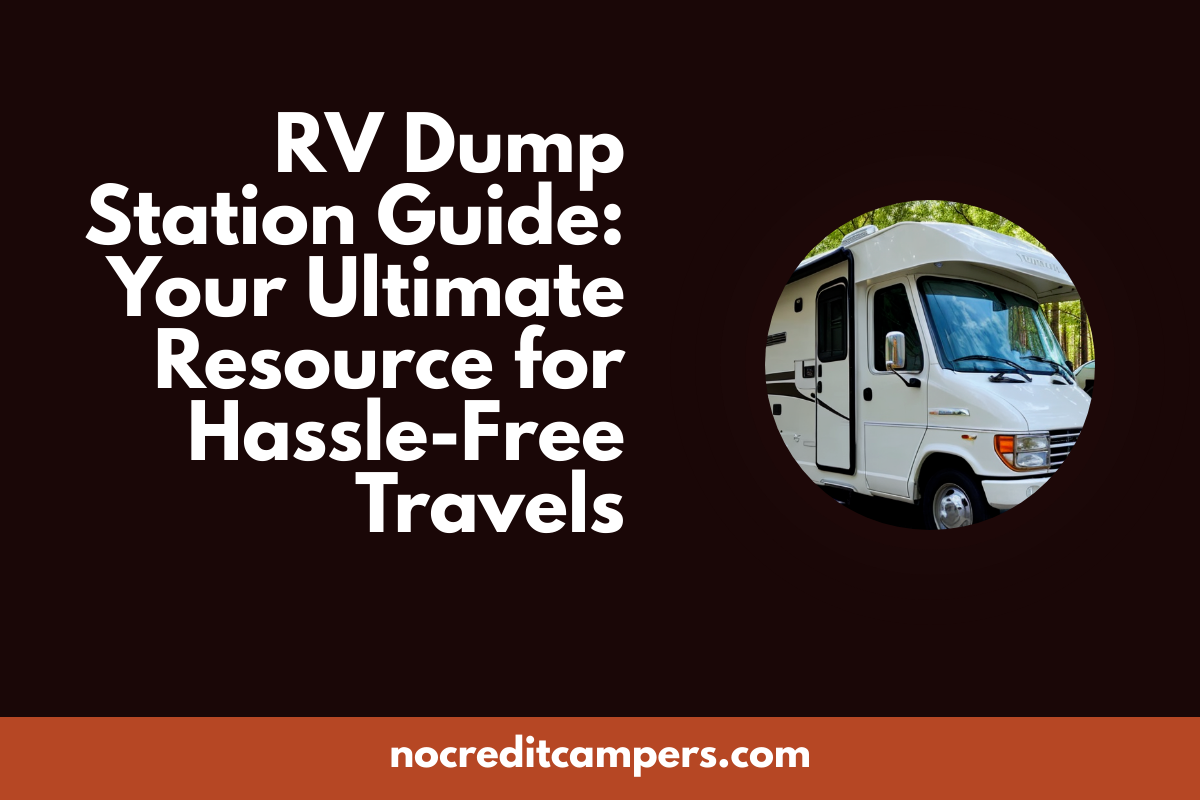For the avid RVer, finding a reliable RV dump station is as crucial as discovering the perfect campsite. This guide serves as a comprehensive resource, ensuring your travels remain hassle-free. From uncovering nearby dump stations, understanding the amenities they offer, to navigating through the etiquette and regulations of dumping practices, this article covers it all. Additionally, we’ll discuss planning your route with dump stations in mind and offer exclusive insights, including books and recommendations for efficient RV travel.
How to Find an RV Dump Station Near You
Using a Map of RV Dump Stations for Quick Reference
One of the most convenient ways to find a dump station near you is by using a map of RV dump stations. Various online resources offer detailed maps showcasing locations across states like Wyoming and beyond. These maps make it easy to find dump stations available near your current location or planned route, simplifying the search process significantly. Whether you’re looking for free dump stations or those within parks and campgrounds, a comprehensive map can serve as an invaluable tool.
Apps and Resources to Find Dump Stations While on the Road
In today’s digitally driven world, there are plenty of apps and online resources designed to help you find dump stations while on the go. These platforms not only allow you to search for dump stations near your current location but also provide details like fees, hours of operation, and available amenities. Some apps even offer user reviews, making it easier to pick the best station for your needs. Remember, finding the nearest RV dump station can be as simple as a few taps on your smartphone.
Considering Rest Areas, Truck Stops, and Travel Plazas as Options
Rest areas, truck stops like Love’s Travel Stop, and travel plazas are often overlooked options that frequently offer dump stations. These locations are not only easy to find along highways but also provide additional conveniences such as gas stations, fresh water, and sometimes even rinse water for tanks. When planning your route, consider incorporating stops at these facilities, especially if they are free for registered campers or offer dump stations at a minimal cost.
Understanding the Amenities Offered at RV Dump Stations
Distinguishing Between Free of Charge and Paid Services
The amenities at RV dump stations can vary significantly, and so does their cost. While many dump stations are free, especially those located in campgrounds or state parks where you’re a registered guest, others charge a fee. It’s important to know this beforehand to plan accordingly, whether it means carrying cash or being prepared for possible service charges. Additionally, some stations offer amenities like fresh water refills or even propane refills, adding more value to the service provided.
Identifying Stations with Water and Propane Refill Options
Beyond the basic dump service, some stations go the extra mile by offering water and propane refill options. This can be incredibly convenient, allowing you to tackle multiple chores in one stop. However, these additional services may come at an extra cost or be free for registered campers in certain RV parks and campgrounds. Identifying these stations ahead of time can help streamline your itinerary, ensuring you have everything you need for a comfortable and hassle-free trip.
RV Parks, Campgrounds, and National Parks with On-Site Dump
Many RV parks, campgrounds, and national parks offer on-site dump facilities, providing an added convenience for campers. These facilities are usually well-maintained and are either free for registered guests or available for a nominal fee to visitors. When planning your stay, inquire about the availability of dump stations, as well as fresh water fill-up points, to ensure a smooth and eco-friendly stay within these natural retreats.
Navigating Dump Station Etiquette and Regulations
Copyright Notice and Permissions for RV Dump Station Use
Before using an RV dump station, it’s essential to understand any permissions or copyright notices associated with the location. Some dump stations, especially those within protected parks or managed by public works, may require special permissions or adherence to specific dumping protocols. Always check for posted notices or ask a site manager for guidelines to ensure you’re in compliance and respecting the operational standards of the facility.
Proper Disposal Techniques to Protect the Environment
Protecting the environment is paramount when utilizing dump stations. Employing proper disposal techniques, such as using eco-friendly chemicals in your tanks, ensuring a thorough and clean disposal, and using hoses designated for rinse water, can minimize your impact on the surrounding ecosystem. Be mindful of local wildlife and vegetation by following best practices for waste disposal, contributing to the preservation of these environments for future generations.
Laws and Restrictions Concerning RV Dumping Practices
It’s imperative to be aware of local laws and restrictions concerning RV dumping practices in the areas you visit. Different states and localities may have specific regulations designed to protect their natural and public resources. Failing to adhere to these laws can result in fines and legal consequences. Whether you’re in a state park, national park, or utilizing public works facilities, always ensure your practices align with local guidelines to avoid penalties and protect public health and safety.
Planning Your Route with Dump Stations in Mind
Incorporating Stops in Campsites and Attractions with Facilities
When mapping out your journey, consider incorporating stops at campsites and attractions that offer necessary facilities, including dump stations. This not only ensures you have regular access to dumping facilities but also allows you to explore and enjoy scenic spots, campgrounds, and state parks that come equipped with the amenities you need. Planning your route with these considerations in mind can enhance your travel experience, making it smoother and more enjoyable.
Finding RV Dump Stations Along Highways and in State Parks
RV dump stations are commonly found along major highways and within state parks, offering ease of access for those on the move. By planning your travel route along these corridors, you can ensure that you have easy access to dumping facilities when you need them. Many of these locations are also positioned near popular attractions and scenic viewpoints, allowing you to combine practical stops with unforgettable experiences.
Destination-Specific Considerations: National Parks and Tourist Attractions with Amenities
When visiting national parks and tourist attractions, it’s wise to consider destination-specific amenities, including the availability of RV dump stations. While some locations might offer comprehensive facilities with dump stations, fresh water, and other services, others might have limited or no amenities. Researching ahead of your visit can save you time and ensure that your focus remains on enjoying the scenic beauty and attractions without worrying about practical necessities.
FAQ
Q: Where can I find a dump station near my camp destination?
A: To find the closest dump station near your camp destination, you can check out resources like Campendium, iOverlander, or the Department of Transportation websites of the state you're visiting. RV parks have dump stations, public works facilities, and some service stations also offer dump stations for travelers.
Q: Are there free dump stations available for registered overnight guests at campgrounds?
A: Yes, many campgrounds and parks have dump stations that are free for registered overnight guests. It's a common amenity offered to ensure comfort and convenience for RVers during their stay.
Q: What are my options near popular destinations like Yellowstone or Grand Teton National Parks?
A: Popular destinations like Yellowstone and Grand Teton National Park have nearby campgrounds and RV parks that offer dump stations. These facilities may be free for registered guests or available for a nominal fee for visitors. Checking the national park's website or using RV-specific apps can provide helpful information.
Q: Can I use dump stations during winter in destinations like Wyoming or Denver?
A: Use of dump stations during winter in colder locations like Wyoming or Denver can be limited. Many stations close to prevent freezing. However, stations that are open 24 hours a day may still be accessible. Always call ahead or check online for the most current information during the colder months.
Q: Are there any nationwide chains or centers along I-80 that offer dump stations?
A: Yes, some nationwide chains of truck stops and service stations along I-80 offer dump stations. These are often open 24 hours and can be convenient for RVers traveling across states. A small fee might be charged to use the facilities.
Q: How do I use dump stations efficiently to empty my holding tanks?
A: To use dump stations efficiently, start by ensuring your RV's holding tanks are ready to be emptied. Connect your sewer hose to the RV and then into the dump station's inlet. Release the black water tank first, followed by the gray water to help clean the hose. Always wear gloves and ensure a tight connection to avoid spills.
Q: What should I know about the etiquette at RV dump stations?
A: RV dump station etiquette includes lining up and waiting your turn patiently, preparing your hoses and connections in advance to speed up the process, and thoroughly cleaning the area after use. Consider using environmentally friendly chemicals in your tanks, and never leave trash or disposable gloves behind.
Q: Are there options for RVers to find dump stations while traveling through less popular routes or rural areas?
A: Yes, RVers traveling through rural areas or less popular routes can still find dump station options. Many smaller campgrounds, public works sites, and some state parks in rural locations offer dump stations. Utilizing RV apps and community forums can be especially helpful for discovering stations in less trafficked areas.






